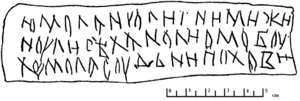Birch bark text No. 292
The birch bark text No. 292 ( Russian : Новгородская берестяная грамота № 292 Novgorodskaja berestjanaja gramota ) is the oldest known document in a Baltic Finnish language . The birch bark text is dated to the beginning of the 13th century. It was recovered in 1957 by a Soviet expedition led by Artemi Arzichowski during the excavations in Nerewski near Novgorod . It is now in the Novgorod State Museum Reserve .
The language used is considered to be an archaic form of Livvian , the language whose current form is spoken in Olonez . However, due to the scarce material, the exact relationship is difficult to determine.
text
The text is written in Cyrillic in the Karelian dialect . The transcription is reproduced as follows:
- юмолануолиїнимижи
- ноулисѣханолиомобоу
- юмоласоудьнииохови
interpretation
Various translations have been proposed over the years. Overview:
Yuri Yelisseyev
Yuri Yelissejew suggested the following transliteration and translation in 1959:
| German transmission | ||
|
jumolanuoli ï nimizi |
Jumalannuoli, kymmenen [on] nimesi |
God's arrow, ten [is / times] your name |
Yeliseyev suspects that it is an invocation against lightning , which he attributes to the construction "ten [is / times] your name". According to shamanistic beliefs, knowing a name gives a person power over an object, person or phenomenon.
Martti Haavio
Since the orthography does not use punctuation marks , the text can also be read differently. Martti Haavio interpreted the text in 1964 as a kind of oath :
|
jumolan nuoli inimizi |
Jumalan nuoli, erhisen |
God's arrow, man's |
Yevgeny Chelimsky
Yevgeni Chelimski criticizes Haavio's interpretation in an essay from 1986 and interprets the text itself as an invocation:
|
Jumalan nuoli 10 nimezi |
Jumalan nuoli 10 nimesi |
God's arrow, ten your name |
- Syyttö-Jumala could also be translated as "God to blame" or "God gives blame"; in modern Finnish means syyttää = accuse, prosecute.
literature
- Yuri Sergeevich Yeliseyev: Vanhin itämerensuomalainen kielenmuistomerkki. Virittäjä-lehti 1961. p. 134.
- Yuri Sergeevich Jelisejev : Itämerensuomalaisia kielenmuistomerkkejä (summary: Baltic Finnish language monuments ), Virittäjä-lehti 1966, p. 296 ( kotikielenseura.fi ).
- Martti Haavio: The Letter on Birch-Bark No. 292. In: Journal of the Folklore Institute. 1964. JSTOR 3814030 .
- Martti Haavio: Tuohikirje n: o 292. Vanha suomalaisen muinaisuskonnon lähde. Virittäjä-lehti 1964: 1 ( haku.tsv.fi ( memento of March 10, 2007 in the Internet Archive )).
- Willem Vermeer: Aspects of the oldest Finnic poem and some related texts (Novgorod birchbark documents 292, 56 and 403), in: Studies in West Slavic and Baltic Linguistics. Amsterdam 1991, pp. 315–359 (Studies in Slavic and General Linguistics 16)
- Eberhard Winkler : Notes on two linguistic monuments of the Baltic Finnish languages, in: Linguistica Uralica 34 (1998), pp. 23-29.
- Johanna Laakso: Vielä kerran itämerensuomen vanhimmista muistomerkeistä , in: Virittäjä 103 (1999), pp. 531-555 (PDF, Finnish - with an English summary) .
Web links
- Birch bark letter no.292 with photo and references (Russian)
- Tuohikirje 292 ( Memento from May 27, 2007 in the Internet Archive )
- kirjazh.spb.ru (Russian)
Individual evidence
- ↑ Артемий Владимирович Арциховский, Виктор Иванович Борковский, Институт языкознания (Artemij Vladimirovič Arcihovskij, Viktor Ivanovitch Borkovski, Institute âzykoznaniâ): Новгородские грамоты на бересте из раскопок 1956-1957 гг. - Novgorodskie gramoti na Bereste. Iz raskopok 1956-1957 gg., [Gramoti 195-318] . изд-во Академии Наук СССР (izd-vo Akademii Nauk SSSR), Moscow 1963, OCLC 492019302 (Russian, Novgorod letters on birch bark from the excavations from 1956–1957).
- ↑ Itämerensuomalaista kirjoitusta 1200-luvulta ( Memento of March 8, 2000 in the Internet Archive )
- ↑ YS Yeliseyev (Елисеев Ю. С.): Древнейший письменный памятник одного из прибалтийско-финских языков. (Drevneischij pismennij pamajatnik odnogo is pribaltiisko-finskich yasikov - The oldest written monument of a Finnish dialect on the Baltic Sea.) Russ. Academy of Sciences, 1959, Volume 18, Fasc. 1, pp. 65-72.
- ↑ God's arrow, ten [is] your name / This arrow is God's own / The Doom-God leads
- ↑ a b Information on Karelier from SI Kochkurkina, AM Spiridonov, TN Jackson, 1996
- ↑ God's arrow, man's / arrow, and (his) own arrow. / [To be chained by the Doom-God.]
- ↑ E. Helimski (Хелимский Е. А.): О прибалтийско-финском языковом материале в новгородских берестяных грамам. (O pribaltijsko-finskom jasikobom materiale v newgorodskich berestjanich gramotach - texts of the Finnish languages on the Baltic Sea in the Novgorod birch bark) In: VL Janin (Янин В. Л.). A. Salisnjak (Зализняк А. А.): Новгородские грамоты на бересте (из раскопок 1977-1983 гг - Nowgororodskie Gramoti na Bereste - Novgorod letters on birch bark (from the excavations from 1977 to 1983). Комментарии и словоуказатель к берестяным грамотам. (из раскопок 1951–1983 гг.) / АН СССР. Отд-ние истории. - М .: Nаuка, 1986. pp. 254–255.)
- ↑ God's arrow, ten your name (s) / Arrow sparkling, arrow shoots / The Doom-God guides / directs (leads / rules?)

